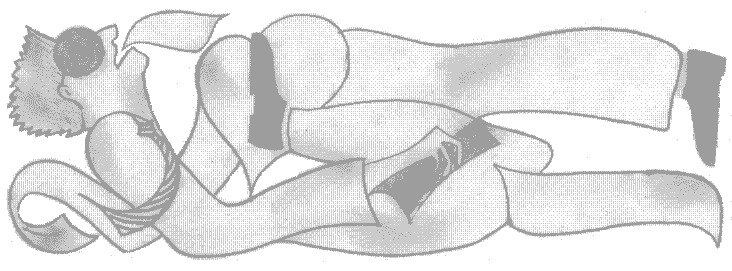jejunant & abstinent . poetarum chori.
vitant rixas publicas . & tumultus fori
& ut opus faciant . quod nonpossit mori
moriuntur studio . subditi labori
― The Archpoet (xii c)
Philip Levine has been chosen Poet Laureate of the US - He's one of us.
Or maybe not, if you follow the liberal media. For it is a fact universally acknowledged by the Universal Class that Poetry is on the side of the angels, so what could a poet do but celebrate the values of liberalism: work is hard, of course, and being of the working class; but there's a grandeur there, a noble resignation in those who might have made it out like us, and failed, and that's what Levine's about:
Ah, yes, something sad — beautiful, yet sad, n'est-ce-pas?— about getting flattened by a fork-lift truck. This is the kind of sentimental crap Levine set out to fight from his first days as a real poet and his first days on the factory floor; it's the speck of shit that irritates him to the occasional pearl,
Max Raphael, the Marxist art historian and critic, wrote that most "progressive" culturati, from liberal to Communist, were Proudhonians at heart, practicing a form of double-entry book-keeping: If Property is Theft, then Culture must be the good side of the Profit motive, that's why it's called "not-for-profit" when it's anything but. Culture, says Raphael, "stages in a well-ordered tableau the wishes of the petit bourgeois," and there is no prettier tableau (forgive my French) than Redemption through Work. On the level of literary form Levine has shied away (or rather: shies away) from that kind of romanticizing rhythm: his poetry often reads like syllabics (shies away) that resist a slide into iambics (has shied away):
Levine’s of that American generation naïve enough to believe that poetry, too, can be found in translation, even if the translator (Bly, or Merwin, whoever) knows nothing of the original. Levine tends to read at times as if freely translated from the Proletarian – and it’s a well-known fact that Proletarians speak in monosyllables; but it’s Levine’s own consciousness, his skill at moving in and out of his other skins that reveals and redeems him: a Proudhonian, no doubt; at least a self-reflective one.
Levine wrote a revealing introduction to an anthology of his own selections from Keats – and that’s revealing, too. Keats is quoted (or rather, a character in Keats’ “Fall of Hyperion”) who advises The Poet that poetic greatness will come only to those “to whom the miseries of the world /Are misery, and will not let them rest.” Keats’ concept of negative capability becomes, deliberately, a form of conflicted consciousness of class, or, more accurately, a double form of that conflicted consciousness, that of the poet vis-à-vis class consciousness itself, that of the poet vis-à-vis his audiences, real or imaginary. In his autobiographical essays Levine sets a curious narrative around two personae: one, the obnoxious poet who claims him as a father, the other the black factory worker who claims him as a son, first by implicating him in an act of sabotage at the factory back in Detroit, and later by reappearing in his dreams in California, asking for his friendship – testing his loyalty, a Magwich to his Pip.

Someone at the New York Times called Levine once "a large, ironic Whitman of the industrial heartland,” in other terms a real American, a mirror of the mighty world of illiterate strivers. Well, what do you expect of the New York Times? Kenneth Fearing once quoted some editor’s dictum that had become a rule, he claimed, of every narrative in the American mass media: "The heroine may fall, but she must fall upward." Levine’s heroes are the reverse: the type that refuses to be assimilated into the hegemony of greed: the gas-station attendant in a Ross Macdonald thriller, the mom-and-pop owner with a piano in the back room, the New York cabbie who's a virtuoso sitar player on the side; anarchists all, of course, for whatever that means to them, and to Levine at least this means something fairly specific, he’s a poet who's proud of having grown up "red;" who writes of laying flowers on the grave of the Catalan anarchist Durruti; who's made it his life's work to rip apart the lie of the American work ethic; who counts himself among those who were never fooled by that Big Shoulder bullshit; the ones who've known all along that the myth of the individual striver would sooner or later collapse. Their goal has never been to create a culture that's congruent with work under capitalism because such a culture is impossible; their goal, above all else, has been to build a culture that exists in spite of work:
"I hear America screwing people over:" sure doesn't sound like Whitman. Levine owes more than he acknowledges, and not as much as he might need, to the great American-Yiddish poets like Moyshe-Leyb Halpern, who wrote poetry in an easy combination of erudition, existentialism and anarchism, and barely made a living pressing shirts; who never had any illusions that culture and social class were of two separate realms; the difference is, that it's this culture that Levine refuses to bring into his own work, and the repression weighs heavily on his style:
Jews, blacks, tidewater-Americans: the where-they-come-from, the culture of his subjects and himself is present only by its absence from the real-life experience of assembly-line cogs, it's like watching the negative of a World War Two bomber-squad movie where War Is Hell but Frank Sinatra plays the lovable Kid from Brooklyn; same difference, minus "but," "except," and "Frank Sinatra." When Levine received his nomination as Poet Laureate he commented that he was pleased that the appointment did not require him to write any poetry, because he had no intention of writing a Poem in Praise of Congress to begin with. Nor, I would assume, a Poem in Praise of anything else. That still leaves the question of what a reluctant sujet supposé savoir’s supposed to say to all the seer-suckers out there in the Heartland of America. It’s ironic that Levine was hired by James Billington, Librarian of Congress, author of one of the great classic sourcebooks on the history of the revolutionary dreams of the elite and intellectuals; ironic, or perhaps deliberate, indeed, because in the last instance Levine is not "on the side of the working class," let alone "from" it, merely and far more importantly he’s engaged with the meaning of work because it's through this engagement that one joins the working class. Sartre might have said that engagement is the reverse of being "naturally" of any class, let alone the working class; but then nobody in America is naturally of the working class, we're each and every one unmeltable aliens to one degree or another.
The question remains: To what degree can, or will, Levine turn the relationship scripted for him by his appointment into something altogether different; to what degree can, or will Levine, speak to and for all of us who, like it or not, are getting it backward, and front and back as well?
- PW.
[Last revised 6/14/2012]
WOID XX-08.
ruthless cosmopolitan
